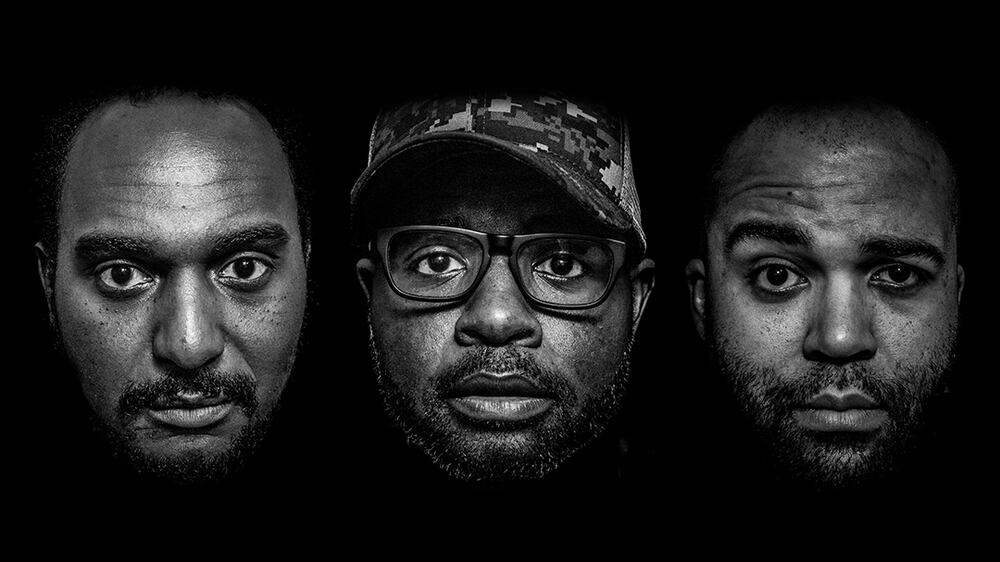Broke Gravy, oddly enough, grew from Noble Rot. The wine list-fueled LoBu eatery was where mutual friends arranged for Florida-born L.A. émigré Leon Anderson to meet fellow Angeleno transplant Chris Williams and Minneapolis native Eric Simons. All three were new to Portland, all three were passionate improv devotees, and the self-described Black Americans each felt some distance from both their adopted hometown and a guiding muse.
"Improv teams, improv crowds," Simons chuckled, "you could just say improv's pretty white."
Earning a dedicated local fan base through a flurry of appearances and workshops, the group won rave reviews at comedy festivals across the continent. Despite steadily gaining momentum, the effective ban on performances due to Oregon's ongoing COVID-19 restrictions should've forced an act so dependent on engaging live crowds to go on hiatus. But the three friends quickly responded to disastrous circumstances with the launch of weekly podcast Whatchu Wanna Know—a streamable hangout that couches incisive social and political commentary within the hosts' infectious rapport and free-flowing riffage.
As the trio readied its 36th episode for election night, Anderson and Simons sat down with WW to discuss some of the challenges for comedians of color performing in front of audiences regularly described as the nation's least diverse.
WW: Were people always trying to introduce you to other comedians of color?
Leon Anderson: I wish there were enough of us in the improv industry where that would be an issue [laughter]. I was very enthusiastic, because up until recently I'd never been onstage with another Black male. Since starting improv in 2005, I'd only performed with two other Black women, so having this opportunity felt like a breath of fresh air.
Eric Simons: When I was performing in Minneapolis, I did manage to spend a bit of time with an all-Black team, but, in a semi-similar way to Leon, it wasn't until getting here that I really found a group that fully clicked.
Anderson: With something like improv, all three of us bring our own particular tool kit. Obviously, we have our own strengths, our own likes and dislikes, but there are shared experiences. There's a background. There's a root. We're able to just dive into topics that we know intimately and be ourselves onstage.
When you are performing in front of an all-white audience, are there times…?
Anderson: Are we worried they won't get our humor or be able to connect with different life experiences? That's the majority mentality—"You need to know about Sum 41 as much as I do!" I'm grateful to be able to perform with Broke Gravy and put a story onstage that makes an audience ask a question. If I was performing with a typical improv group, addressing topics like slavery would be extremely uncomfortable for me and the audience, but because we're bringing a truth not often seen or shown, that gives us the freedom to possibly dig a little more into some of those more provocative or taboo areas.
Simons: I mean, we absolutely want to see more audiences of color, but people are busy. They have only so much free time and money to spend, and they want to try and see something close to their life experiences. When me and Leon performed at Curious [Comedy], I'd walk in to do the late show and actually see a couple people of color in the crowd just looking at the all-white performing group. When you don't see yourself reflected, it's hard to say, "Let's go check out an improv show!"
Would you ever leave Portland?
Anderson: The pace and the quality of life up here is real solid. I feel that I can get a lot done or go off into nature if needed. There's the food and the arts. Really, the only thing I have to leave town to find is diversity and that connection to Black culture.
Simons: You always hear that there are no Black people in Portland. You're right, there aren't any, and there's a reason why that is. People outwardly express themselves as liberal without doing anything to help increase the population of Blacks in Portland or make it a more desirable place to live. They're still looking for what's most comfortable for them.
Is Portland intrinsic to your act?
Anderson: No, no and no. I think this is 100-percent transferable, and the evidence there is how we've been received at festivals. Going to Rhode Island and really finding a community that loves what we bring. Alberta, Canada—they love them some Broke Gravy.
So, Portland finally diversifies through marketing and comedy?
Anderson: Right, Eric? [Laughter] We're going to be the start! They'll write history books about how Broke Gravy changed the demographics of the Pacific Northwest!
LISTEN: Whatchu Wanna Know streams at brokegravy.com/podcast. New audio can be downloaded every Tuesday. Free.

